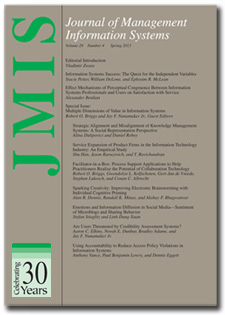利用邻域知情的合成样本放置改进不平衡机器学习
IF 5.9
2区 管理学
Q1 COMPUTER SCIENCE, INFORMATION SYSTEMS
引用次数: 0
摘要
摘要机器学习在信息系统设计中得到了广泛的应用。然而,在不平衡的数据集上训练算法可能会严重影响在看不见的数据上的性能。例如,在医疗保健、金融科技或网络安全环境中的某些情况下,某些子类很难学习,因为它们在训练数据中的代表性不足。我们的研究提供了一种基于新的合成平均邻域采样算法(SANSA)的灵活高效的解决方案,与其他解决方案相比,该算法引入了一种新的“放置”参数,可以对其进行调整,以适应每个数据集不平衡的独特表现。这个软件包可以为R1下载。我们针对现有的七种采样方法以及在14个基准数据集上训练的四个最常用的机器学习模型对SANSA进行了测试。我们的结果提供了提示性证据,表明SANSA为大多数数据集的不平衡问题提供了一个可行的解决方案。我们的研究结果为如何有效实施SANSA,同时降低不平衡学习管道的复杂性提供了切实可行的建议。本文章由计算机程序翻译,如有差异,请以英文原文为准。
Improving Imbalanced Machine Learning with Neighborhood-Informed Synthetic Sample Placement
ABSTRACT Machine learning is widely used in information systems design. Yet, training algorithms on imbalanced datasets may severely affect performance on unseen data. For example, in some cases in healthcare, fintech, or cybersecurity contexts, certain subclasses are difficult to learn because they are underrepresented in training data. Our study offers a flexible and efficient solution based on a new synthetic average neighborhood sampling algorithm (SANSA), which, in contrast to other solutions, introduces a novel “placement” parameter that can be tuned to adapt to each dataset’s unique manifestation of the imbalance. This package can be downloaded for R 1 . We tested SANSA against seven existing sampling methods used in conjunction with the four most frequently used machine learning models trained on 14 benchmark datasets. Our results provide suggestive evidence that SANSA offers a feasible solution to the imbalance problem for most datasets. Our findings provide practical recommendations for how SANSA can be effectively implemented while reducing the complexity level of an imbalanced learning pipeline.
求助全文
通过发布文献求助,成功后即可免费获取论文全文。
去求助
来源期刊

Journal of Management Information Systems
工程技术-计算机:信息系统
CiteScore
10.20
自引率
13.00%
发文量
34
审稿时长
6 months
期刊介绍:
Journal of Management Information Systems is a widely recognized forum for the presentation of research that advances the practice and understanding of organizational information systems. It serves those investigating new modes of information delivery and the changing landscape of information policy making, as well as practitioners and executives managing the information resource.
 求助内容:
求助内容: 应助结果提醒方式:
应助结果提醒方式:


